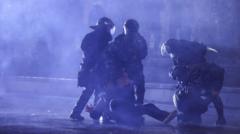Tensions in Georgia have intensified as protests continue unabated for six nights following the government's controversial decision to pause the nation's bid to initiate European Union (EU) accession talks. Over 300 individuals have been arrested amid escalating violence and allegations of severe police brutality, with heartbreaking accounts emerging from the protestors.
One of them, Avandtil Kuchava, recounts a harrowing experience where he was repeatedly kicked in the head by police, leading to a critical medical emergency. "When I opened my eyes a third time, I couldn't feel my legs or hands," he shared, revealing the ominous aftermath of police engagement. These protests were ignited after the ruling Georgian Dream party halted the EU membership discussions, stirring citizens to accuse the government of forsaking their European future and pulling them back into Russia's sphere of influence.
Prime Minister Irakli Kobakhidze has vigorously rebutted these claims, attributing the unrest to orchestrated opposition efforts and denying accusations of police excess. In stark contrast, the nation's human rights ombudsman denounces the visible brutality, likening it to systematic torture. A statement from UN rights chief Volker Türk has echoed concerns over the government's use of "unnecessary and disproportionate force."
The harsh police response has been compared to the actions of authoritarian regimes, commented by critics who assert that the government's strategy mirrors that of Russia. During clashes, videos surfaced depicting protestors confronting helmeted law enforcement and bearer of tear gas and water cannons. One notable incident involved a woman named Nana Tomaradze, who defiantly challenged police while later facing fines equivalent to her two months’ wages for her actions.
Human rights advocates have spoken out against the apparent targeting of specific protestor demographics, particularly their faces and heads, with many presenting with visible injuries. Reports indicate that despite the police's claims of protecting public safety from "violent gangs," many arrested protestors have experienced brutal treatment while in custody.
The unrest has led some protestors to demand a re-run of contested elections, claiming substantial missteps in the electoral process that the government seems disinclined to address. Amid these tumultuous public demonstrations, activists are urging international awareness of their struggle, portraying it as a fundamental battle between Western democratic values and the influence of Russia.
While Georgian authorities have acknowledged some violence, they continue to place blame on opposition factions, further complicating discourse around accountability. As protests unfold and tensions remain high, the future remains uncertain for those advocating for a more European-aligned Georgia.



















